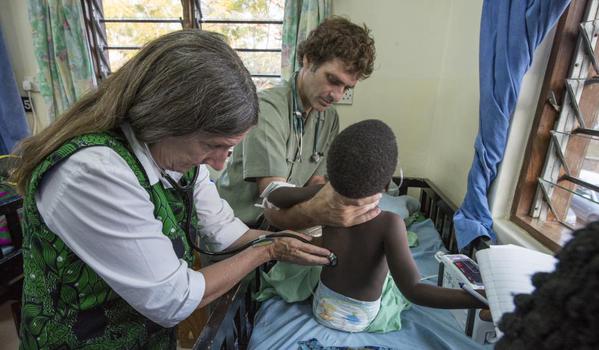Sometimes stopping the spread of a disease isn’t enough to cure it. For instance, the effects of malaria can still kill even after the parasite has been eradicated. Fortunately, researchers from Michigan State University, East Lansing are working on ways to halt the adverse effects of malaria.
 MSU Professor of Internal Medicine Terrie Taylor (image left, courtesy of MSU) is a true expert on malaria. She spends six months of the year in the African nation of Malawi so that she can conduct malaria research and simultaneously treat patients.
MSU Professor of Internal Medicine Terrie Taylor (image left, courtesy of MSU) is a true expert on malaria. She spends six months of the year in the African nation of Malawi so that she can conduct malaria research and simultaneously treat patients.
Her biggest concern at the moment is cerebral malaria, the deadliest form of malaria, which has been claiming children in Malawi even after the malaria parasite is treated. In an effort to pinpoint the problem, Taylor used an MRI to compare the brains of the survivors and the victims. This may sound like a simple and perhaps even obvious solution, but in Blantyre, Malawi, ordering an MRI is not a decision made lightly: the closest MRI was 1000 miles away.
Fortunately, the MRI scans provided groundbreaking results.
“We found that survivors’ brains were either never swollen or decreased in size after two to three days. This was a triumphant moment,” says Taylor in a recent MSU press release. This led to the discovery that brain swelling was the true cause of death. The brain gets so large that it compresses the brain stem, which causes children to stop breathing. The swelling is extremely clear to see in an MRI scan, but very difficult to detect with the naked eye.
Taylor was, understandably, thrilled by the results. “I wanted to say to the parasite ‘Ha! You never thought we’d get an MRI, did you?’”

(Taylor checks up on one of her patients. Image courtesy of MSU)
This breakthrough gives the MSU team a much more solid footing in terms of treating the disease. “Because we know now that the brain swelling is what causes death, we can work to find new treatments,” Taylor says of the team’s future plans. “The next step is to identify what’s causing the swelling and then develop treatments targeting those causes.”
The National Institute of Allergy and Infectious Diseases of the National Institutes of Health funded the research. For more information on the grants MSU earns with its outstanding research, peruse our free Funding Statistics report, below:
Biotechnology Calendar, Inc. pays a visit to Michigan State University each year for the East Lansing BioResearch Product Faire™, a life science event held right on the university campus. Make sure to mark your calendar for July 22nd, 2015 when we next return to MSU.
Biotechnology Calendar is a full service event company that has produced on-campus, life science research trade shows nationwide for the past 20 years. We plan and promote each event to bring the best products and services to the finest research campuses across the country. If you are a university researcher or a laboratory product vendor, consider attending one of our on-campus trade shows: here is our 2015 schedule.



